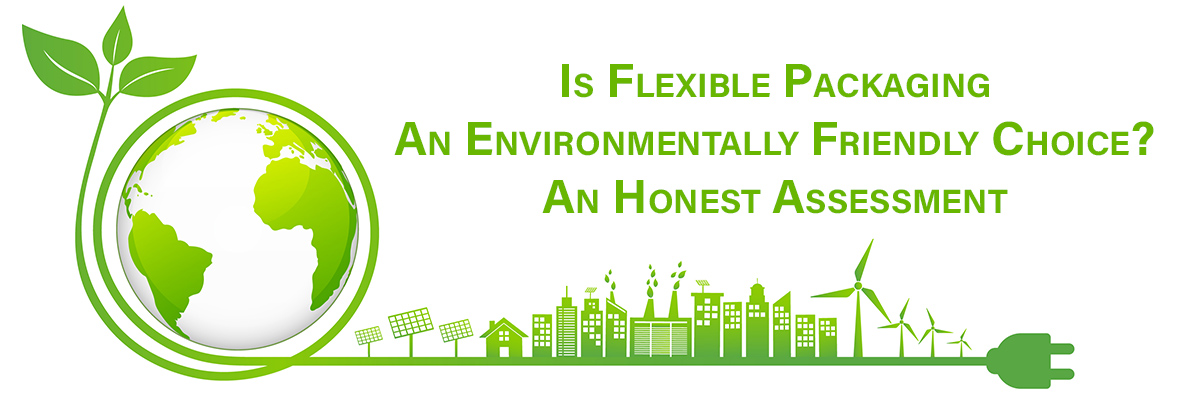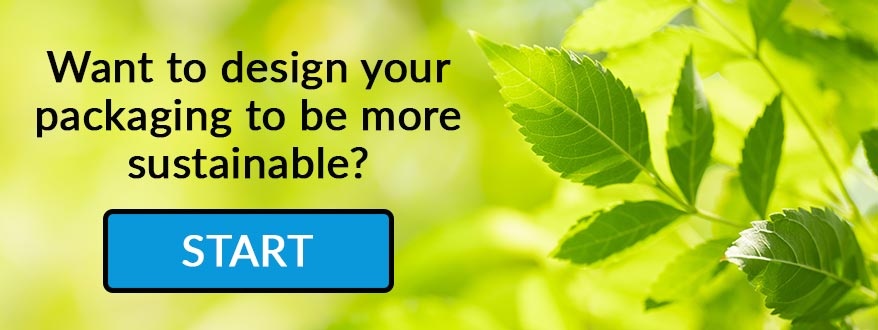Is Flexible Packaging An Environmentally Friendly Choice? An Honest Assessment
Environment | The Business of Packaging | Packaging Design | Packaging Psychology
Now that we have reached the future and are currently living in 2020, (What a time to be alive) environmental friendliness, sustainability and recycling are going to be a major focal point for brands and consumers alike.
You’ve heard about the damage that plastics are causing in our oceans, but that’s not the full truth. Here at Industrial Packaging, we specialize in flexible packaging so we wanted to look at the facts to dispel a common myth.
When it comes to packaging materials, flexible packaging supplies such as shrink film and stand up pouches are currently the most environmentally friendly materials for packaging your products. This, however, isn’t the long-term solution. We will go into more detail on that later.
Yes, flexible packaging items are made of soft plastics. However, contrary to modern preconceptions and emotional reactions to this substrate, science proves that they are STILL the most environmentally friendly choice for packaging. This article will help to inform you of your packaging options and their impact on the environment
Sustainable Green Packaging VS Alternatives
Wait, what is green packaging?
Green packaging is a form of sustainable packaging. Sustainable packaging is the development and use of packaging that leads to more sustainable practices and earth-friendly materials. This process results in greater product life cycles as well as superior assessments of packaging material life cycles. This is done to help reduce the impact on the environment and prevent ecological harm.
Flexible packaging supplies (which are primarily made from various plastic polymers) are the best choice for packaging products for the environmentally concerned consumer. In an age where plastics have come under attack the world over for the problems they present to our oceans, this fact is often overlooked.
Many brands are starting to switch to materials such as glass bottles, cardboard boxes, metal containers and other types of alternative packaging supplies. For the most part, they are doing this to distance themselves from plastic due to the notion that these alternative materials are better for the environment. In truth, however, they are not...
From NPR:
"One thing the CIEL analysis doesn't do, however, is examine the carbon footprint of things that would replace plastic — things such as paper, canvas or glass.
Several research groups like this one and this one have, including the United Kingdom's Environment Agency. And plastic comes out ahead most of the time. (Heavier-duty plastics, such as low density polyethylene or woven polypropylene bags, do have a bigger climate and energy impact than paper, but they're more durable and you get more use out of them.)
Chemical engineer Beverly Sauer of Eastern Research Group, an independent research company, led one such study that compared a mix of different plastic packaging with substitutes such as paper. "The impacts associated with plastic are generally much lower than the impacts for the mix of substitute materials that would replace packaging," Sauer says."
In reality, the alternatives to plastic are more detrimental to our planet earth. The negative backlash against plastics has grown exponentially in recent years. This is tied to increased awareness of environmental nightmares such as the great pacific garbage patch. The majority of waste in this geographical area is plastic, most of which is fishing supplies.
And while the alarm and outrage over these environmental atrocities is warranted, the focus of this anger being on plastic is not... The truth is that even with the environmental problems that plastic produces, it is still vastly better for the environment than glass, metal, cardboard, canvass and the other currently available alternatives.
Want to design your packaging to be more sustainable?
Recyclable Packaging Materials VS Flexible Packaging Supplies
Despite the fact these aforementioned materials are being lauded as viable environmentally safer replacements for plastic, they have a significantly higher carbon footprint than their plastic counterparts. The move from plastics to these other materials is an unfortunate byproduct of green-washing.
Wait, green-washing? What is that?
From Wikipedia:
"Greenwashing (a compound word modeled on "whitewash"), also called "green sheen", is a form of marketing spin in which green PR (green values) and green marketing are deceptively used to persuade the public that an organization's products, aims, and policies are environmentally friendly and therefore ‘better’; appeal to nature. Common examples present in the marketing of food products, alternative medicine, and natural medicine.
Evidence an organization is greenwashing often comes from pointing out the spending differences: when significantly more money or time has been spent advertising being "green" (that is, operating with consideration for the environment), than is actually spent on environmentally sound practices. Greenwashing efforts can range from changing the name or label of a product to evoke the natural environment on a product containing harmful chemicals to multimillion-dollar marketing campaigns portraying highly polluting energy companies as eco-friendly. Greenwashing is therefore a "mask" used to cover-up unsustainable corporate agendas and policies. Highly public accusations of greenwashing have contributed to the term's increasing use. "
Biodegradable Packaging Materials
If we replaced all plastic packaging supplies with glass, metal and/or cardboard, the only thing we would effectively achieve is diverting pollution from our oceans, exponentially increasing it, and moving it into our air supply via carbon emissions. Moving away from plastics may produce a "feel-good" atmosphere for consumers. In reality, moving away from plastics (at this current time) significantly increases our damage to planet earth.
Of course, plastics are not a long term environmental solution, like most packaging materials, they never really were. The future of sustainable packaging materials rests with bio-polymers and plant-based plastics that bio-degrade and present virtually no harm to the environment whatsoever.
Materials like bio-polymer based shrink films (such films made from rice) are the earth-friendly, flexible packaging materials of the future. These materials act like traditional plastics but are made from plants that bio-degrade and compost quickly instead of taking thousands of years to break down.
Removing Plastic From The Earth In The Future
With the on-going issues of single-stream recycling and contamination problems that prevent our plastics from being recycled properly, we all have to wonder... what are we going to do with all this plastic that we as humans have generated since it's invention?
From the various ocean clean up projects, to advanced recycling processes like terra-cycle, there are many initiatives that are working to reduce and eventually completely eliminate plastics from our planet. And while that might seem virtually impossible with all the plastics we have in our landfills, it is just such a place that we may have found a 100% natural solution to the complete removal of plastics altogether.
In fact, it was in a landfill in Pakistan where scientists discovered a unique fungus that actually eats plastic... Furthermore, other studies suggest there are multiple plastic-eating entities such as this bacteria which could pave the way to expediting the process of bio-degrading plastics.
This could result in a much faster and organic way to remove plastics form the earth that would other wise take thousand of years to break down. Until these creatures are able to do this work on a large scale basis, the best choice we have for environmentally friendly packaging materials remains flexible packaging plastics.
Making an Environmentally Sound Decision With Your Packaging.
The truth of that matter is that plastics are our best option for the environment when it comes to packaging supplies. That being said, plastics are not perfect and pose their own serious problems to our planet earth. In the future, we will see the rise of advanced bio-polymers, plant-based plastics, and other materials that will change packaging for ever.
Until then, plastic flexible packaging supplies will remain the most environmentally friendly materials for packaging your products. If you’re interested in learning about the flexible packaging options for your business, Industrial Packaging would love to help.
About Nathan Dube
As the Digital Marketing Specialist at Industrial Packaging, I am honored to create content for such a phenomenal company and work with one of the greatest teams in the Packaging Industry. Whether creating a video, writing blog posts or generating other pieces of content and multimedia, I am always excited to help educate and inspire our prospects and clients to reach their highest potential in regards to their packaging processes and needs.




